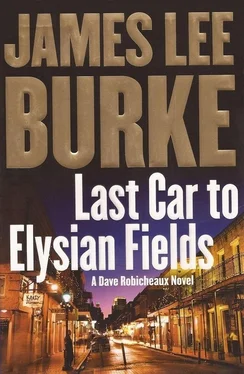“No, thanks,” I said.
He clipped a Mepps spinner on his monofilament and cast it deep into the cove. “Something happen today?” he asked.
I told him about my encounter with Frank Dellacroce at the motel, about his attempt to put me on a pad, about his mention that Clete had once taken juice from the Mob. Clete retrieved his lure, his face never changing expression.
“So what’s the point?” he said.
“I don’t like a degenerate bad-mouthing my friends. I don’t like being offered a bribe,” I replied.
He waited a long time before he spoke again. “I don’t think that’s the problem, noble mon,” he said.
“Oh?”
“You think all this belongs in a time capsule,” he said, making a circle in the air with his hand. “Outsiders aren’t supposed to come here, particularly grease balls and Wal-Mart and these cocksuckers grinding up the trees with bulldozers. It’s always supposed to be 1950.”
“I see.”
“The truth is you wish you had all these bastards locked in your sights inside a free-fire zone.”
“Glad you’ve figured it all out.”
“At least I don’t sleep with a nine-millimeter anymore.”
“Don’t be offended when I say this, but, Clete, you can really piss me off sometimes.”
“You worry me, mon. I think you’re going into a place inside yourself that people don’t come out of.”
I saw a bass roll among the flooded trees, like a green-gold pillow of air violating the symmetry of the surface. I cast my Rapala above the place he had broken the water, hoping to retrieve it across his feeding area. Instead, the balsa wood lure clacked against the trunk of a willow and the treble hooks went deep into the bark.
“I’ll row us over there,” Clete said.
“Not on my account,” I said. I jerked the monofilament with my hand and snapped it off. The sun disappeared on the horizon like a flame dying on a wet match.
Way leads on to way.
I tried to go to bed early that night but I couldn’t sleep. Rain began to click on the trees, then on the tin roof of my house, and I dressed and drove up the bayou road in the rain to St. Martinville. On the edge of the black district I went into a brightly lit cafe and ordered a cup of coffee and a small bowl of gumbo at the counter. A door with a beaded curtain was cut in one wall, and in the adjoining room a man was playing an accordion, while another man, with thimbles on his fingers, accompanied him on an aluminum rub board that had been molded to fit the contours of his chest.
The people in the other room were all light-skinned people of color, often called Creoles, although originally the term Creole had denoted a person of French or Spanish ancestry who had been born in the New World. The people in the next room were blue-collar mulattos whose race was hard to determine. They drifted back and forth across the color line, married into both white and black families, still spoke French among themselves, and tended to be conscious of manners and family traditions.
Seated in one corner by himself was Frank Dellacroce, a shot and a glass of beer by his hand, his legs crossed, his silk shirt unbuttoned in order to expose his chest hair and the gold chain and medallion that rested on it. He tossed back the whiskey and flexed his mouth as though he had just performed a manly act. Then he tilted back his head, the small of his back against the seat of the chair, and seemed to resume his concentration on the music. The song the accordionist was playing was “Jolie Blon,” the most haunting and unforgettable lament I have ever heard. Then I realized that the object of Frank Dellacroce’s attention had nothing to do with music, or a song about unrequited love and the loss of the Cajun way of life: Frank Dellacroce’s attention was fixed on the shapely form of a young Creole woman dancing by herself.
Her name was Sugar Bee Quibodeaux. Her eyes were turquoise, her hair the color of mahogany, fastened in back with a silver comb, her gold skin dusted with sun freckles. She also had the mind of a seven year old. She had conceived her first child when she was twelve and at age fifteen was taken to a state hospital by her grandparents and sterilized. Sometimes a local cop or a kind neighbor or business person tried to protect her from herself, but ultimately no one could restrain Sugar Bee’s love of boys and men and the excitement and joy her own body gave her.
I finished eating and paid my check at the register. Through the beaded curtain I could see Sugar Bee sitting at Frank Dellacroce’s table, a bottle of beer and a glass in front of her. She was leaning forward, listening to something he was saying. He leaned forward, too, his hand deep under the table Then the two of them stood up and she picked up her purse, one with white sequins and tassels on it, and hung it by a string from her shoulder. They walked through the beaded curtain toward the front door.
“That’s far enough, Frank,” I said.
He turned around, half smiling. “You following me?” he said.
“Nope.”
“Then we got no problem here. Right?”
“Yeah, I think we do,” I said.
“No, no, man,” he said, wagging his finger. “I ain’t done nothing wrong.”
“That’s a matter of definition, Frank,” I said.
“We talking about a racial issue here?”
“You’re going back to your motel, Frank. You’re going back alone. Got the drift?”
“I checked you out, Robicheaux. You’re an AA. rum-dum people around here feel sorry for. But that don’t mean you get to beat up on guys like me ‘cause I’m Italian or from New Orleans or whatever the fuck it is about me that bothers you.”
I looked at my watch. “Your coach is about to turn into a pumpkin,” I said.
He stepped toward me. “This is a free country. You don’t like what me and the lady are doing, I say suck my dick. Now, you get out of my face and out of my space ‘cause I really fucking don’t like you, man.”
“At this point I’m placing you under arrest. Put your hands behind you and turn around, please,” I said.
“Arrest? For what?” he said, his face incredulous.
“Disturbing the peace, creating a public nuisance, using profanity in public, that sort of thing. I’ll think of some more charges on the way down to the jail,” I said.
“This ain’t even your jurisdiction,” he said.
But I wasn’t listening now. I turned him toward the wall and hooked him up, then pushed him out the door into the parking lot. It had stopped raining, and the air was cold and wet, and fog was rolling out of the trees across the road. Sugar Bee and several other patrons of the cafe and bar had walked outside and were watching us.
“You armed, Frank?” I said.
“Want to search my crotch? Be my guest,” he replied.
I fitted my hand under his arm and moved him toward the hood of my truck. That’s when he hawked phlegm out of his throat and spat it in my face.
I felt it in my eyelashes, on my mouth, in my hair, like a skein of obscene thread clinging to my person. I picked him up by his belt and slammed him into the fender of the truck, then drove his head down on the hood. But Frank Dellacroce was not one to give up easily; though his wrists were cuffed behind him, he brought one hand up and clenched it into my scrotum.
I smashed his head into the hood again, then got my handcuff key out of my pocket and unhooked him. I spun him around and drove my fist into his mouth, throwing all my weight into the blow, snapping his head back as though it were on a spring. I saw his lip burst against his teeth, and I hooked him in the eye with a left, caught him on the jaw and in the throat and on the nose as he went down.
He was whipped, but I couldn’t stop. I picked him up by his shirt and hit him again, rolled him off a car fender and drove my fist repeatedly into his kidneys. He collapsed in a mud puddle and tried to drag himself away from me. But I knelt beside him and twisted his shirt in my left hand and drew back my fist to hit him again. He tried to speak, his ruined face pleading. I heard people screaming and felt Sugar Bee slapping at my head with a shoe, her voice keening in the damp air.
Читать дальше












